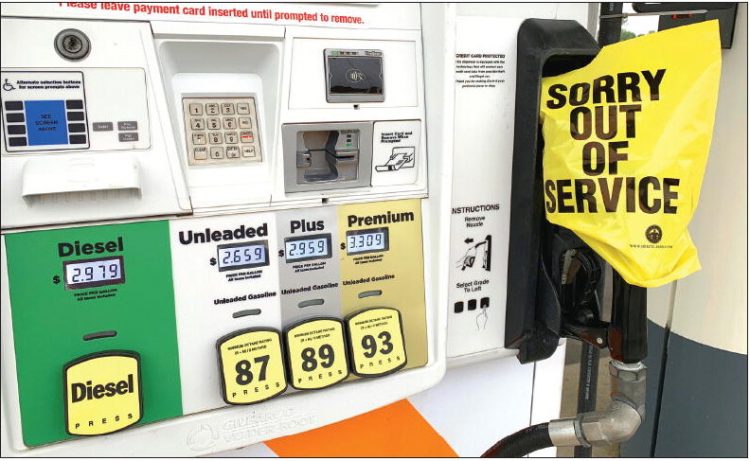Fuel Shortage?


When local resident Heather Mead drove up to Circle K Convenience Store on Highways 297 and 292 in Vidalia Tuesday morning, she encountered bags over the gas pump dispensers announcing “Sorry, out of service.” The second Circle K she entered on Highway 280 had the same message. When she reached Enmark on Highway 280, she was able to pump eighteen cents worth of premium gas before the pump cut off.
Whether the local gas shortage is real or due to panic buying is debatable at this point, but the reality is that one way or another the area is beginning to feel the effects of a gas pipeline disruption due to a cyberattack last Friday. continued from page
Ransomware attacks have become a growing problem for both government and private sector computer systems. In ransomware attacks, hackers block access to an organization’s computers and threaten to keep them blocked and/or publish sensitive private information unless a ransom is paid. In one example, a ransomware attack in 2018 affected nearly 3,800 city of Atlanta computers, forcing the city to shut down its court system and delay many other services. Alpharetta-based Colonial Pipeline reported Friday that it was the victim of an attack involving ransomeware that forced one of the largest fuel transport systems in the nation to halt most of its operations. Colonial’s 5,500-mile pipeline runs from Texas to New Jersey. Woodland Oil of Vidalia, which has approximately 700 to 800 customers in Toombs and Tattnall counties (including farmers and trucking companies but excluding area convenience stores) has been receiving updates from its supplier, Colonial Pipeline, several times a day. Early Tuesday, the local company received the following notice: “Colonial Pipeline is continuing to work in partnership with third-party cybersecurity experts, law enforcement, and other federal agencies to restore pipeline operations quickly and safely. While this situation remains fluid and continues to evolve, the Colonial operations team is executing a plan that involves an incremental process that will facilitate a return to service in a phased approach.
“Shipper nomination, scheduling, and inventory systems are down, and nomination changes and additions cannot be accepted at this time. Colonial will advise shippers when nominations can be updated and new schedules produced. As Colonial resumes operations on delivery, stub lines, and main lines, the system will be operated based on the schedules currently in Transport 4 (a branch line supplier).
“We can now report that Line 4, which runs continued from page
from Greensboro, N.C., to Woodbine, Md., is operating under manual control for a limited period of time while existing inventory is available. As previously announced, while our main lines continue to be offline, some smaller lateral lines between terminals and delivery points are now operational as well. We continue to evaluate product inventory in storage tanks at our facilities and others along our system and are working with our shippers to move this product to terminals for local delivery.
“Our primary focus remains the safe and efficient restoration of service to our pipeline system, while minimizing disruption to our customers and all those who rely on Colonial Pipeline. We will continue to provide updates as restoration efforts progress.”
In his Capitol Beat column, Dave Williams reported that Colonial has hired independent cybersecurity experts to determine the nature and scope of the ransomware attack and to put an operations team to work developing a system restart plan with a goal of “substantially restoring operational service” by the end of this week, the company wrote in an update Monday.
While four main lines remain out of service, some smaller lines connecting terminals with delivery points are now operational, Williams reported.
The full system will not be restored until Colonial officials believe it is safe to do so and in full compliance with federal regulations, the company stated. The U.S. Department of Energy is leading the federal response.

NO GAS FOR YOU – Local resident Heather Mead visited three different locations trying to buy gas Tuesday morning. She encountered closed pumps at two convenience stores and could only buy eighteen cents worth of premium gas at another location.








